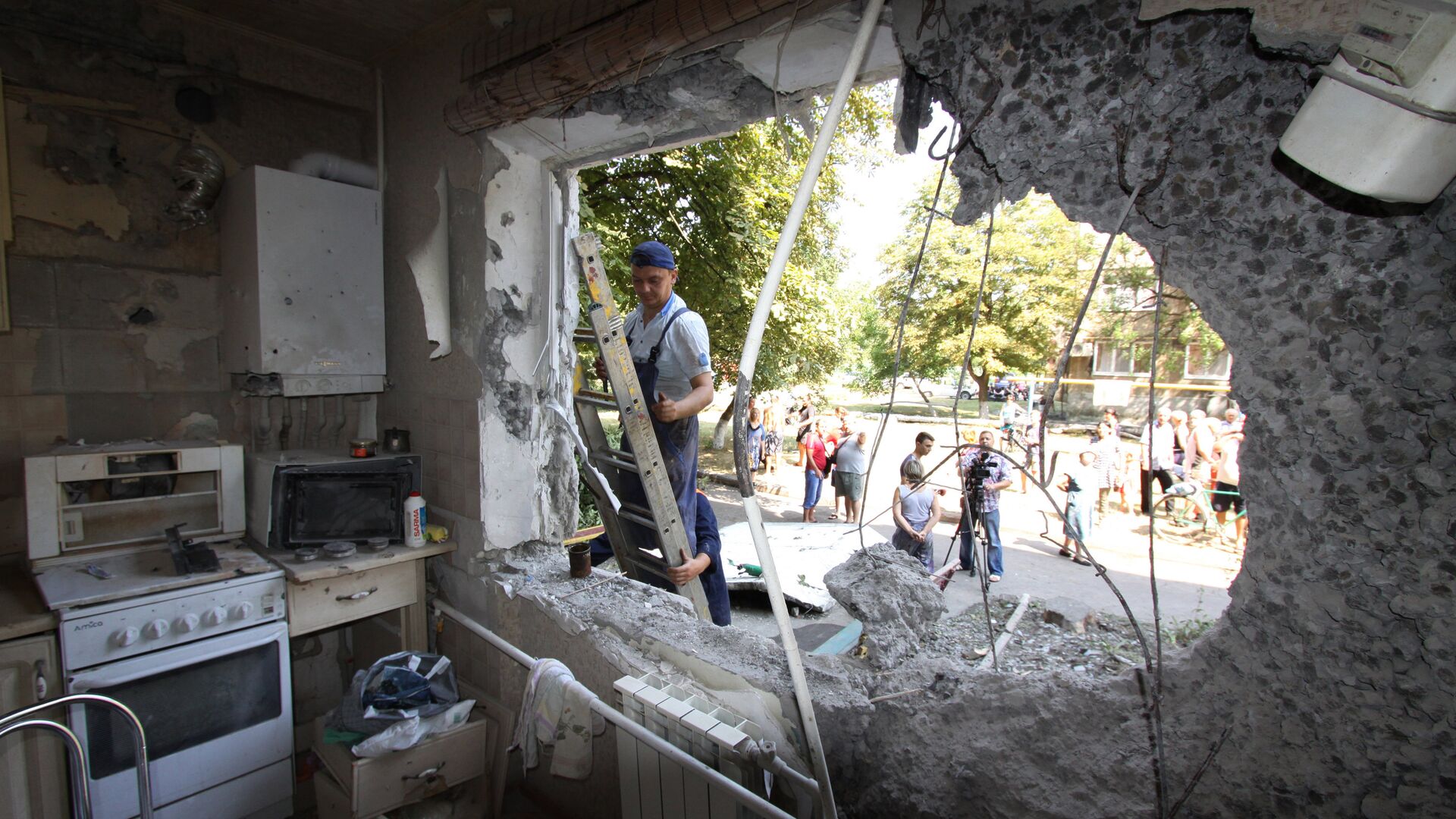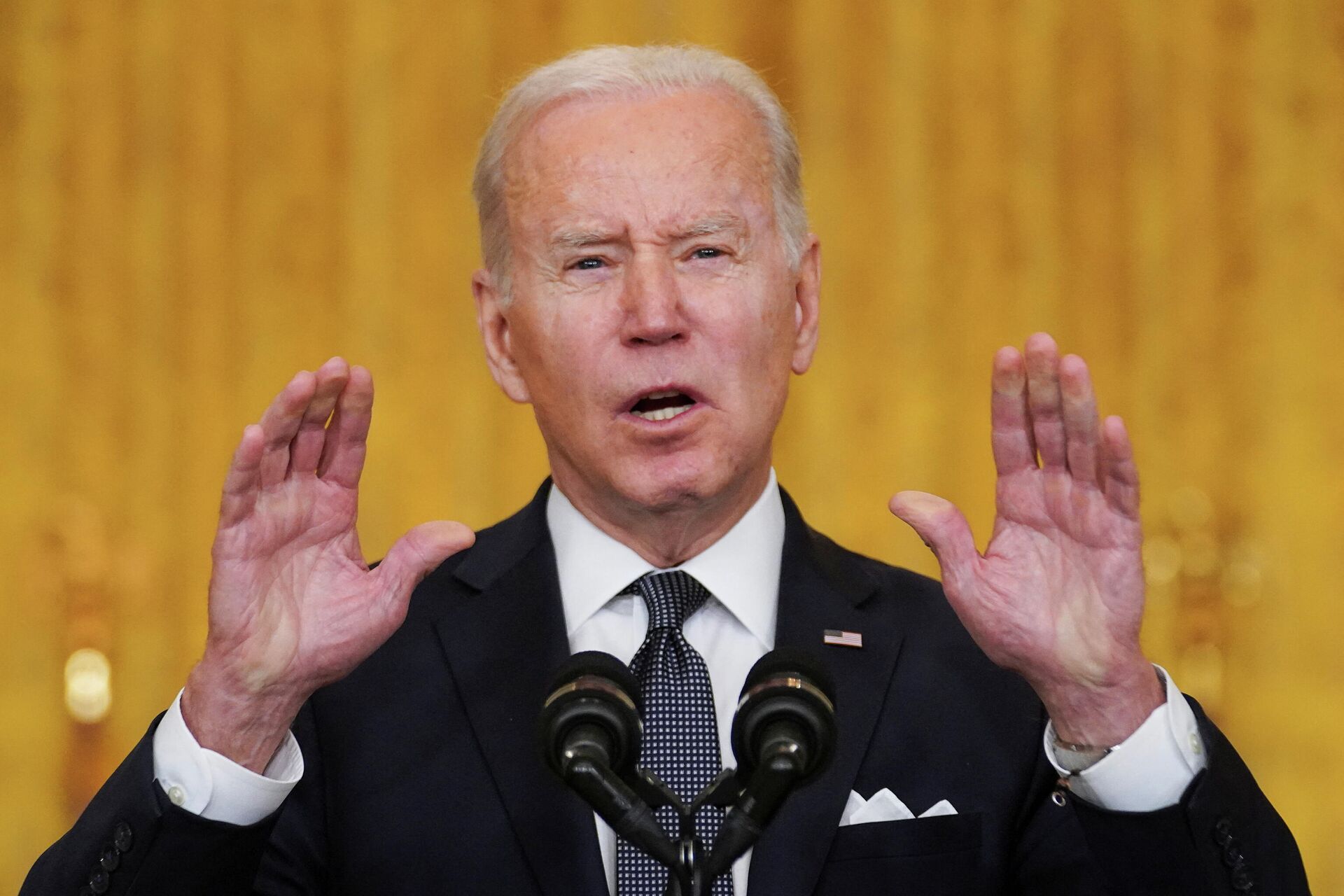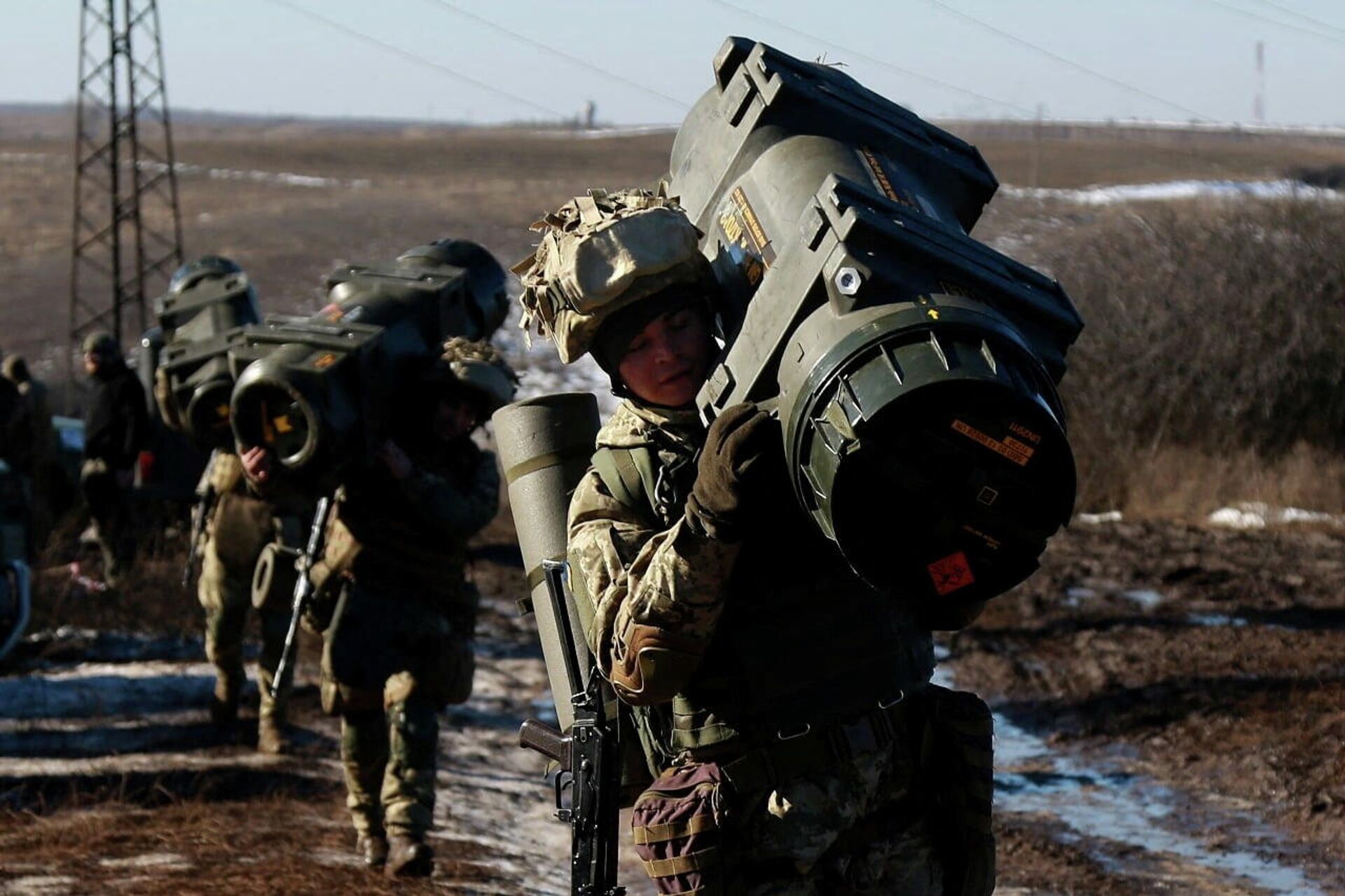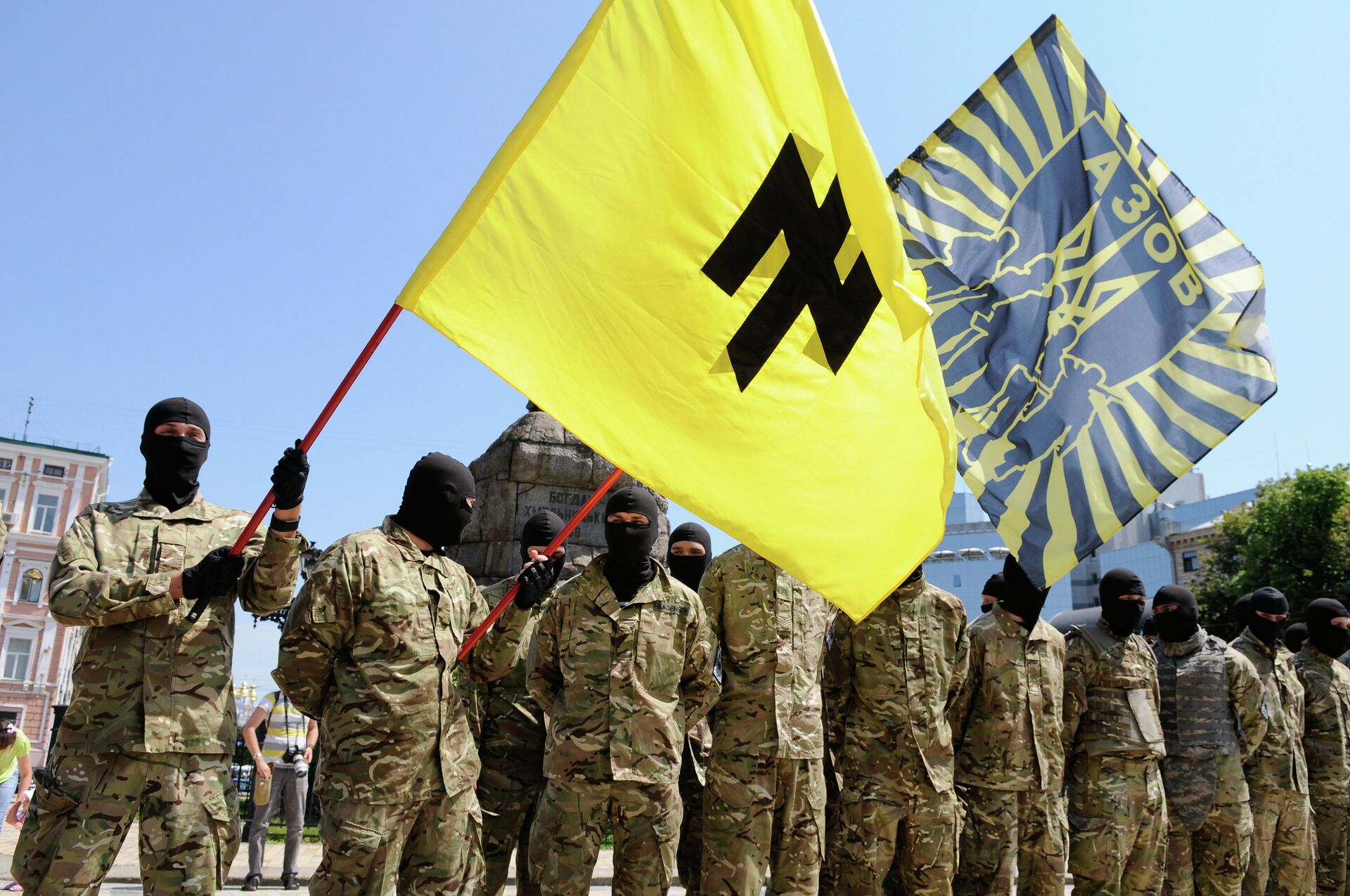https://sputnikglobe.com/20220217/why-us-nato-cast-doubt-on-russias-military-drawdown--turn-blind-eye-to-donbass-debacle-1093120284.html
Why US, NATO Cast Doubt on Russia's Military Drawdown & Turn Blind Eye to Donbass Debacle
Why US, NATO Cast Doubt on Russia's Military Drawdown & Turn Blind Eye to Donbass Debacle
Sputnik International
Regardless of Russia’s troop withdrawal from the country's southern border with Ukraine, Western countries and NATO are continuing to fan the "Russian... 17.02.2022, Sputnik International
2022-02-17T16:57+0000
2022-02-17T16:57+0000
2022-10-19T20:59+0000
us
russia
nato
nato expansion
ukraine
donbass
minsk agreements
donetsk people's republic
europe
vladimir putin
https://cdn1.img.sputnikglobe.com/img/104488/93/1044889367_0:160:3073:1888_1920x0_80_0_0_f63e2eb7ec7e6f62c0ee0f2ad81d7402.jpg
"A fractured Ukraine is useful for the West, because it gives it greater control over Ukraine, grants it pressure points that enhance its relentless eastward expansion", says Joseph Oliver Boyd-Barrett, professor emeritus at Bowling Green State University, Ohio. "Humanitarian goals are merely the West's pretexts for interventions in the sovereign affairs of other nations, rarely the main or even any kind of real motivation".Russian President Vladimir Putin called the situation in eastern Ukraine's breakaway republics "genocide" after his meeting with German Chancellor Olaf Scholz on 15 February. The conflict in eastern Ukraine has been going on for over seven years, claiming the lives of more than 13,000 people, according to the UN.Between August and October 2021, in the village of Slavyanoserbsk, in the area of the residential area Sokogorovka Pervomaisk, the village of Vidnoye-1 near Lugansk and on the outskirts of the village of Verkhneshevyrevka, Krasnodonsky district, five mass graves were discovered, according to the Investigative Committee of Russia. The remains of at least 295 civilians, including women, who were killed by indiscriminate shelling by Ukrainian armed forces in 2014, were exhumed.The Donbass civilians are being demonised as "Russian separatists" in order to justify the arming of Ukrainian government forces and notorious neo-Nazi battalions by the US and its NATO allies, according to the scholar.Meanwhile, it is Ukraine's ultra-nationalist militias, some of whom joined Ukraine's National Guard, who pose the real security threat to the country, warns Stephen Ebert, US author and political analyst:There's No Alternative to Minsk AgreementsOlaf Scholz and French President Emmanuel Macron, who along with Russia are the Normandy Four guarantors, confirmed during their meetings with Vladimir Putin earlier this month that the Minsk accords approved by the UN Security Council in 2015 have no alternative. Despite saying that it backs the Minsk deal, Kiev is refusing to hold a direct dialogue with Donetsk and Lugansk, seeking to refurbish the agreement according to its own vision. It appears that major Western European states and the US have made little if any efforts to pressure Ukraine to adhere to the deal over the last seven years, according to Gagnon.For its part, the Western corporate press has fallen short of reporting the truth about the 2014 coup in Ukraine, atrocities by neo-Nazi battalions, the Minsk agreements as well as the fact that Kiev has recently amassed 150,000 troops up along the line of contact with Donbass in clear defiance of the deal, according to Gagnon."The media is covering the Minsk agreement, but not any Ukraine violations of it", echoes John Tures, political science professor at LaGrange College in Georgia. "If Ukraine is actually preparing to attack the Donbass region now that would be a serious error in judgment on their part".In December 2021, the Russian Foreign Ministry noted that thousands of foreign military instructors and mercenaries had been deployed in Ukraine. The US and its NATO allies have also stepped up their weapons supplies to the Eastern European country. Moscow has repeatedly warned that by boosting military aid to Kiev, the West could encourage the Ukrainian leadership to further snub the Minsk deal and launch a new offensive against Donbass.Why is NATO, US Claiming That Russia is Not Pulling Back?The Russian Defence Ministry reported on 15 February that the southern and western military units had begun returning to their bases of permanent deployment following scheduled drills on the southern border near Ukraine. However, NATO Secretary General Jens Stoltenberg refused to call Russia's withdrawal of troops a de-escalation.The Biden administration has cast doubt on Russia's military drawdown, with US Secretary of State Antony Blinken claiming that critical Russian units were moving "toward the border, not away from the border". Earlier, the US and the UK insisted that a Russian invasion of Ukraine could happen "at any time", citing 15 and 16 February as deadlines for a potential offensive which never materialised. Moscow has repeatedly shredded the "invasion" claims as groundless.NATO will sustain the pressure even if Russia withdraws its forces from its southern-western regions, according to Joseph Oliver Boyd-Barrett.The Western media has "resolutely failed" to report that Russian military exercises came as a response to highly provocative drills by NATO and Ukraine near Russian borders and in the Black Sea, according to the academic. In November 2021, 10 US strategic bombers rehearsed the option of using nuclear weapons against Russia almost simultaneously from the western and eastern directions during the Global Thunder exercises. The US planes came within 20 km (12.4 miles) of the Russian border, according to the Russian Ministry of Defence.In mid-December 2021, Moscow submitted its draft security agreements to US and NATO officials to ensure European stability. On 26 January 2022, Russia received written responses to its proposals from Washington and the alliance. Both the US and NATO disregarded Moscow's core demands of the legally binding guarantees of the alliance's non-expansion, non-deployment of offensive weapon systems near the Russian border, and the return of the bloc’s European capabilities and infrastructure to the 1997 level.
ukraine
donbass
Sputnik International
feedback@sputniknews.com
+74956456601
MIA „Rossiya Segodnya“
2022
News
en_EN
Sputnik International
feedback@sputniknews.com
+74956456601
MIA „Rossiya Segodnya“
Sputnik International
feedback@sputniknews.com
+74956456601
MIA „Rossiya Segodnya“
us, nato, nato expansion, ukraine, donbass, minsk agreements, donetsk people's republic, europe, vladimir putin, joe biden, lugansk people’s republic
us, nato, nato expansion, ukraine, donbass, minsk agreements, donetsk people's republic, europe, vladimir putin, joe biden, lugansk people’s republic
Why US, NATO Cast Doubt on Russia's Military Drawdown & Turn Blind Eye to Donbass Debacle
16:57 GMT 17.02.2022 (Updated: 20:59 GMT 19.10.2022) Regardless of Russia’s troop withdrawal from the country's southern border with Ukraine, Western countries and NATO are continuing to fan the "Russian invasion" scare. Meanwhile, Kiev's military build-up on the line of contact in Donbass and indiscriminate killing of civilians in Eastern Ukraine are left beyond the scope of the US and EU narrative.
"A fractured Ukraine is useful for the West, because it gives it greater control over Ukraine, grants it pressure points that enhance its relentless eastward expansion", says Joseph Oliver Boyd-Barrett, professor emeritus at Bowling Green State University, Ohio. "Humanitarian goals are merely the West's pretexts for interventions in the sovereign affairs of other nations, rarely the main or even any kind of real motivation".
Russian President Vladimir Putin called the situation in
eastern Ukraine's breakaway republics "genocide" after his meeting with German Chancellor Olaf Scholz on 15 February. The conflict in eastern Ukraine has been going on for over seven years, claiming the lives of more than 13,000 people, according to the UN.
Between August and October 2021, in the village of Slavyanoserbsk, in the area of the residential area Sokogorovka Pervomaisk, the village of Vidnoye-1 near Lugansk and on the outskirts of the village of Verkhneshevyrevka, Krasnodonsky district, five mass graves were discovered, according to the Investigative Committee of Russia. The remains of at least 295 civilians, including women, who were killed by indiscriminate shelling by Ukrainian armed forces in 2014, were exhumed.
"The US-UK-NATO don't care about the people in the Donbass", says Bruce Gagnon, coordinator of the Global Network Against Weapons and Nuclear Power in Space and a contributor to Foreign Policy In Focus.
The Donbass civilians are being demonised as "Russian separatists" in order to justify the arming of Ukrainian government forces and notorious neo-Nazi battalions by the US and its NATO allies, according to the scholar.
Meanwhile, it is Ukraine's ultra-nationalist militias, some of whom joined Ukraine's National Guard, who pose the real security threat to the country, warns Stephen Ebert, US author and political analyst:
"Either continuing, or now very possibly increasing the ongoing military assault on peaceful residents of the Donetsk People's Republic and Lugansk People's Republic, or, by having a few 'misdirected' shots go over the border, can lead to some kind of armed response from Russia", Ebert suggests. "In the case of the so-called National Guard, the latter would most likely in fact be fully intentional in hopes of igniting a larger conflict, and thinking, a la [Georgian President Mikhail] Saakashvili in 2008, that the US and NATO would come to the rescue".
There's No Alternative to Minsk Agreements
Olaf Scholz and French President Emmanuel Macron, who along with Russia are the Normandy Four guarantors, confirmed during their meetings with Vladimir Putin earlier this month that
the Minsk accords approved by the UN Security Council in 2015 have no alternative.
Despite saying that it backs the Minsk deal, Kiev is refusing to hold a direct dialogue with Donetsk and Lugansk, seeking to refurbish the agreement according to its own vision. It appears that major Western European states and the US have made little if any efforts to pressure Ukraine to adhere to the deal over the last seven years, according to Gagnon.
"The West does not want peace in the Donbass", he says. "It wants continued destabilisation and war tensions because this allows US-UK-NATO to advance their military increasingly closer to the Russian borders. A peaceful settlement in the Donbass would ruin Washington's plan for the creation of a failed state in Ukraine which would be a continual headache for Moscow".
For its part, the Western corporate press has fallen short of reporting the truth about the 2014 coup in Ukraine, atrocities by neo-Nazi battalions, the Minsk agreements as well as the fact that Kiev has recently amassed 150,000 troops up along the line of contact with Donbass in clear defiance of the deal, according to Gagnon.
"The media is covering the Minsk agreement, but not any Ukraine violations of it", echoes John Tures, political science professor at LaGrange College in Georgia. "If Ukraine is actually preparing to attack the Donbass region now that would be a serious error in judgment on their part".
In December 2021, the Russian Foreign Ministry noted that thousands of foreign military instructors and mercenaries had been deployed in Ukraine. The US and its NATO allies have also
stepped up their weapons supplies to the Eastern European country. Moscow has repeatedly warned that by boosting military aid to Kiev, the West could encourage the Ukrainian leadership to further snub the Minsk deal and launch a new offensive against Donbass.
Why is NATO, US Claiming That Russia is Not Pulling Back?
The Russian Defence Ministry reported on 15 February that the southern and western military units had begun returning to their bases of permanent deployment following scheduled drills on the southern border near Ukraine. However, NATO Secretary General Jens Stoltenberg
refused to call Russia's withdrawal of troops a de-escalation.
The Biden administration has cast doubt on Russia's military drawdown, with US Secretary of State Antony Blinken claiming that critical Russian units were moving "toward the border, not away from the border". Earlier, the US and the UK insisted that a Russian invasion of Ukraine could happen "at any time", citing 15 and 16 February as deadlines for a potential offensive which never materialised. Moscow has repeatedly shredded the "invasion" claims as groundless.
"This latest episode has been extreme even by US standards", says Daniel Lazare, an independent journalist, author, and writer. "The Biden narrative never made much sense to begin with".
NATO will sustain the pressure even if Russia withdraws its forces from its southern-western regions, according to Joseph Oliver Boyd-Barrett.
"First, NATO salivates for the dismemberment of Russia so as to achieve unregulated access to Russian wealth", the professor says. "Second, the US arms and 'defence' industry and its craven lobbyists, which sit atop of the system of supposed Western 'democracy', salivate for the profits that they earn whenever given the opportunity to stoke fear and hatred".
The Western media has "resolutely failed" to report that Russian military exercises came as a response to highly provocative drills by NATO and Ukraine near Russian borders and in the Black Sea, according to the academic. In November 2021, 10 US strategic bombers rehearsed the option of using nuclear weapons against Russia almost simultaneously from the western and eastern directions during the Global Thunder exercises. The US planes came within 20 km (12.4 miles) of the Russian border, according to the Russian Ministry of Defence.
In mid-December 2021, Moscow submitted its draft security agreements to US and NATO officials to ensure European stability. On 26 January 2022, Russia received written responses to its proposals from Washington and the alliance. Both the US and NATO disregarded Moscow's core demands of the legally binding guarantees of the alliance's non-expansion, non-deployment of offensive weapon systems near the Russian border, and the return of the bloc’s European capabilities and infrastructure to the 1997 level.





